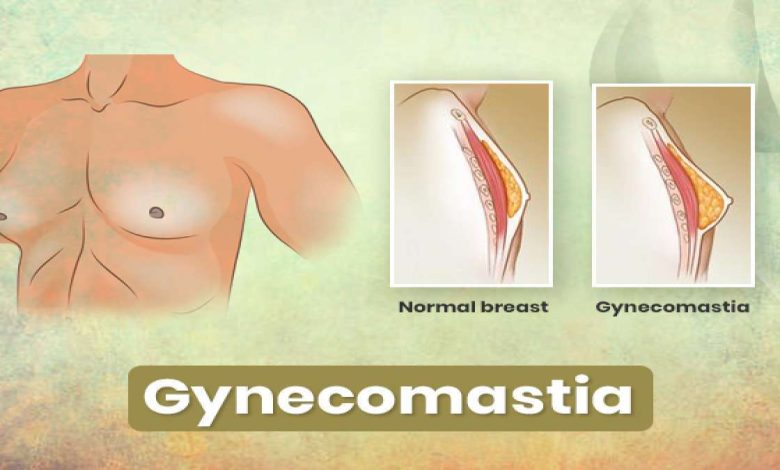Gynecomastia, male breast augmentation: what is this, causes, symptoms, diagnostics, treatment, prevention

Breast enlargement in males; Gynecomastia; Breast enlargement in a male
Gynecomastia is a medical term, used to describe an increase in breast tissue in men. This condition can occur in one or both breasts and can range from slight swelling to large, prominent chest.
Despite, that it is a common disease, Gynecomastia can cause emotional stress and affect a man's self-esteem. This article will provide a comprehensive overview of the status, including its causes, symptoms, when to seek medical help, diagnostics, treatment options, home remedies and prevention measures.
What is gynecomastia?
Gynecomastia is an overgrowth of breast tissue in men, which can occur at any age. This is a benign condition, i.e. not malignant..
The male breast tissue is made up of mammary glands, fat and connective tissue. When glandular tissue increases in size, breasts may appear larger and more pronounced. This can lead to embarrassment and shyness in those, who suffered.
Causes of Gynecomastia
The causes of gynecomastia can be divided into two categories: physiological and pathological. Physiological causes of gynecomastia include normal hormonal changes, occurring during puberty and aging. Pathological causes of gynecomastia include hormonal imbalance, medications and certain illnesses.
- Hormonal Imbalance: Hormonal imbalance can lead to growth of breast tissue in men. Estrogen, female hormone, and testosterone, male hormone, work in balance, supporting male breast tissue. When there is an imbalance, estrogen levels may increase, causing growth of breast tissue.
- Medicines: some medications can cause gynecomastia, changing hormone levels. These medicines include antiandrogens, anabolic steroid, sedatives and antibiotics.
- Disease. Some diseases, such as liver disease, renal failure and hypogonadism, can lead to hormonal imbalance and cause gynecomastia.
Symptoms of Gynecomastia
The most noticeable symptom of gynecomastia is an increase in breast tissue in men.. This can range from a slight swelling to a large, prominent chest. In some cases, the breast tissue may feel tender or inflamed..
When to contact a healthcare professional
If you are experiencing symptoms of gynecomastia, it is important to seek medical attention. The doctor may conduct a physical examination and order laboratory tests, to determine the cause of the disease. He can also recommend appropriate treatment options.
Diagnosis of gynecomastia
The doctor will perform a physical examination and may order laboratory tests to diagnose gynecomastia. These tests may include a hormonal profile, liver and kidney function tests, as well as imaging studies, such as mammography or ultrasound.
Treatment of gynecomastia
Treatment for gynecomastia depends on the underlying cause of the condition.. In some cases no treatment is required, since the condition can go away on its own. In other cases, medication may be required.
- Medication. If the cause of gynecomastia is a hormonal imbalance or medication, Your doctor may prescribe medications to balance your hormone levels..
- Surgery: in severe cases of gynecomastia, surgery may be recommended to remove excess breast tissue. This procedure is known as a mastectomy and is performed under general anesthesia..
home remedies for gynecomastia
Although home remedies may not be effective in treating gynecomastia, they can relieve the symptoms of the disease. Some home remedies include:
- Exercises: regular exercise can help reduce breast size and improve overall fitness.
- Healthy eating. Healthy, A balanced diet can help reduce excess body fat, which can promote breast tissue growth.
- Avoid certain medications: if the medicine causes gynecomastia, your doctor may recommend switching to a different medication.
- Avoid alcohol and recreational drugs: alcohol and recreational drugs can cause hormonal imbalances, which can lead to growth of breast tissue.
Prevention of gynecomastia
Although some cases of gynecomastia cannot be prevented, there are some steps, you can take, to reduce the risk of developing this condition. These include:
- Maintaining a healthy weight. Maintaining a Healthy Weight Can Reduce Body Fat, which reduces the risk of developing gynecomastia.
- Refusal to take certain medications. If you are taking medication, which can cause gynecomastia, your doctor may recommend switching to another medication.
- Avoid alcohol and recreational drugs: Alcohol and recreational drugs can cause hormonal imbalances, which can lead to breast tissue growth.
Used sources and literature
Ali O, Donohoue PA. Gynecomastia. In: Kliegman RM, St. Geme JW, Bloom NJ, Shah SS, Tasker RC, Wilson KM, eds. Nelson Textbook of Pediatrics. 21st ed. Philadelphia, PA: Elsevier; 2020:chap 603.
Anawalt BD. Gynecomastia. In: Jameson JL, The Great LJ, the Circles DM, et al, eds. Endocrinology: Adult and Pediatric. 7th ed. Philadelphia, PA: Elsevier Saunders; 2016:chap 140.
Samson A, Romanelli F, Samson M, Lenzi A, By Louis L. Gynecomastia and hormones. Endocrine. 2017;55(1):37-44. PMID: 27145756 pubmed.ncbi.nlm.nih.gov/27145756/.
